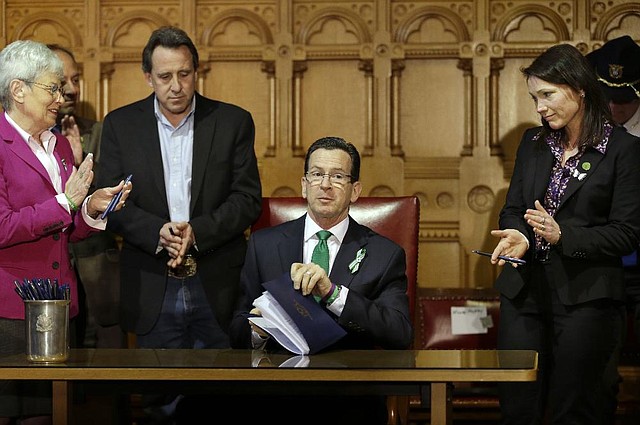New gun curbs set in Connecticut
Bipartisan deal aims to spark action in D.C., governor says
Connecticut Gov. Dannel Malloy (center) completes signing legislation Thursday in Hartford that includes new restrictions on weapons and large-capacity ammunition magazines.
Friday, April 5, 2013
HARTFORD, Conn. - Democratic Gov. Dannel Malloy signed into law sweeping new restrictions on weapons and large-capacity ammunition magazines Thursday in response to the Sandy Hook Elementary School massacre, a bipartisan deal that gun-control proponents hope will spark action in Washington and state legislatures across the country.
Four months ago, the governor broke the news to shocked parents that their children had been slaughtered in the Newtown school. On Thursday, four of those parents joined him as he signed the bill into law during a somber ceremony at the state Capitol, his act giving Connecticut some of the toughest gun-control laws in the country.
Malloy hugged each of the parents and gave them a pen he used to sign the bill.
“We have come together in a way that relatively few places in our nation have demonstrated an ability to do,” he said.
Since the Dec. 14 shooting in which 20 children and six educators were killed, some of their family members have become accidental gun-control advocates, pressing for both tougher state and federal laws.
“This is a path I never thought my life would take. But working to save the lives of others is one way that I can honor Dylan’s life,” said Nicole Hockley, referring to her 6-year-old son, who was killed at Sandy Hook. “We want Newtown to be known not for our tragedy but for transformation.”
Malloy and gun-control advocates said they hope the new law, crafted by legislative leaders from both parties during several weeks of negotiations, coupled with President Barack Obama’s planned visit to the state Monday, will spur action in Washington.
Democratic U.S. Sen. Richard Blumenthal of Connecticut, who still hopes that Congress can enact universal background checks for gun purchases, said many colleagues he’s spoken to were deeply affected by the shooting.
“They may not be there yet in their votes, but emotionally in their hearts they know what the right thing to do is and I’m hoping that they’ll be inspired by Connecticut to do the right thing,” he said.
In an interview on Fox News, National Rifle Association Executive Vice President Wayne LaPierre criticized the legislation.
“The problem with what Connecticut did is the criminals, the drug dealers, the people that are going to do horror and terror, they aren’t going to cooperate,” he said.
At the stroke of Malloy’s pen Thursday, the new law added more than 100 firearms to the state’s assault-weapons ban, effective immediately.
The new law also immediately bans the sale of magazines capable of holding more than 10 rounds of ammunition. People who purchased those guns and magazines before midnight Wednesday will be allowed to keep them, so long as they’re registered with the state police before Jan. 1. Required background checks for private gun sales also take effect.
Other parts of the new law that take effect over the coming year include a ban on armor-piercing bullets, establishment of a deadly-weapon-offender registry, expansion of circumstances when a person’s mental-health history disqualifies him from holding a gun permit, mandatory reporting of voluntary hospital commitments, doubled penalties for gun trafficking and other firearms violations, and $1 million to fund the statewide firearms trafficking task force.
Members of Malloy’s administration met Thursday morning to discuss how to implement the legislation. Malloy said the affected state agencies plan to have everything in place by Aug. 1.
Connecticut lawmakers spent more than 13 hours debating the measure. Ultimately, the bill passed both chambers with bipartisan votes.
“I pray today’s bill - the most far-reaching gun-safety legislation in the country - will prevent other families from ever experiencing the dreadful loss that the 26 Sandy Hook families have felt,” said House Majority Leader Joe Aresimowicz, a Democrat.
Some Connecticut lawmakers questioned whether the wide-ranging bill would have prevented 20-year-old Adam Lanza from blasting his way into his former elementary school.
“These laws will only be obeyed by people who choose to obey them. Criminals will still have their guns and their magazines, and they will still commit their crimes,” said Republican Rep. Robert Sampson. “Do we really think do we really think that adding more laws to our books would have stopped him?”
Maryland’s General Assembly also passed a gun-control measure Thursday, sending the bill to Democratic Gov. Martin O’Malley, who proposed the legislation in the aftermath of the Newtown shooting.
The measure would require people who buy handguns to submit fingerprints to state police, ban 45 types of assault weapons and limit gun magazines to 10 bullets. It also addresses firearms access for the mentally ill.
Maryland will become the first state in nearly 20 years to require potential handgun buyers to submit fingerprints to state police.
Although the measure bans 45 types of assault weapons, people who own them now will be able to keep them. People who order the weapons before Oct. 1, when the law would take effect, also would be able to keep them.
People who have been involuntarily committed to a mental-health facility won’t be allowed to have a gun.
Information for this article was contributed by Stephen Kalin, Jim Kuhnhenn and Josh Lederman of The Associated Press.
Front Section, Pages 4 on 04/05/2013

